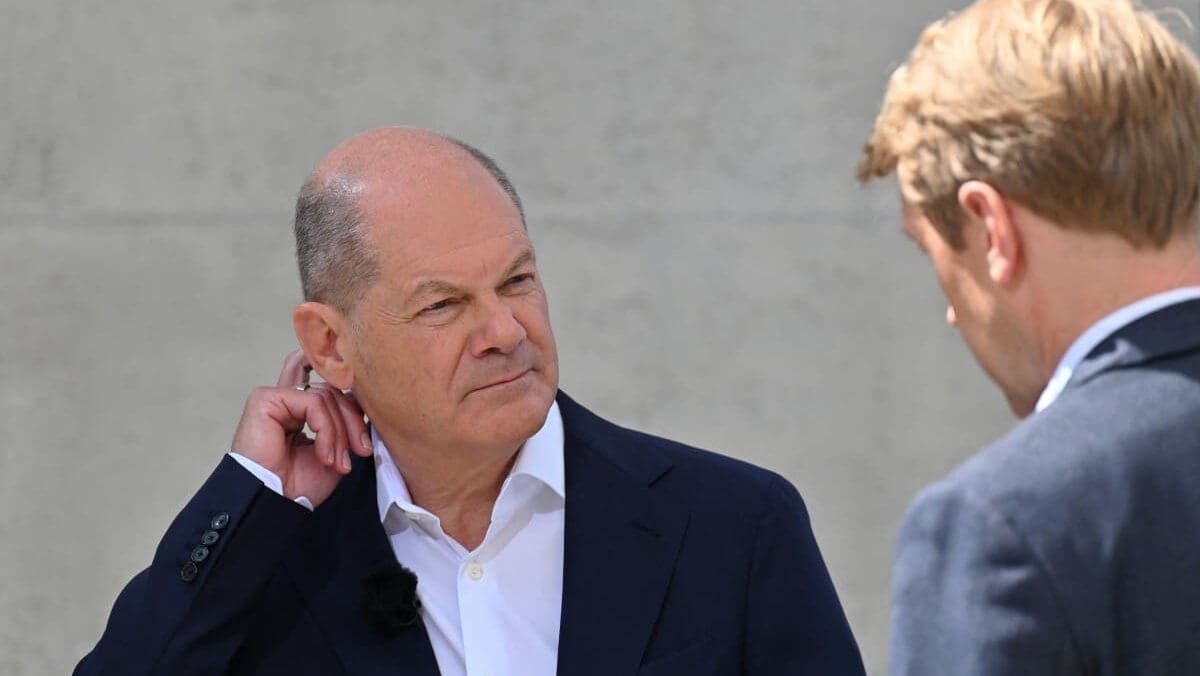
German Chancellor Olaf Scholz speaks with German TV journalist Markus Preiss before the recording of the traditional summer interview with German public broadcaster ARD, in Berlin, Germany on June 23th, 2024.
Photo: RALF HIRSCHBERGER / AFP
In a recent ARD interview, Federal Chancellor Olaf Scholz (SPD) argued that he had always “advocated caution” on compulsory vaccination and lockdowns during the COVID pandemic.
What Scholz neglected to mention was that it was he who drove much of the debate on compulsory vaccination and curfews.
Scholz refused to take any responsibility for—and in some cases declaring himself a critic of—”over the top” decisions made by his government, including the lockdowns.
“I didn’t understand why you couldn’t go for a walk outside at certain times if you were wearing a mask and didn’t meet anyone in the forest. And I don’t think it should have been necessary,” he explained.
The chancellor went on to say that the judiciary had reacted “quite rightly” in criticizing the government’s curtailment of civil liberties in a number of court rulings.
Regardless of his previously stated misgivings about the road taken, Scholz put on a happy face, asserting that “with what we have done, we have managed to ensure that not so many people have died or become seriously ill.”
Scholz did not mention the fact that, on compulsory vaccination, he has made a spectacular about-turn; prior to the 2021 general election, he categorically ruled out such a measure; afterwards, he became one of its most vocal advocates.
Around that time, Scholz also defended overnight curfews and school closures. In April, 2021, the then-Federal Minister of Finance and Vice Chancellor declared he was in favor of the law being amended so that the federal government would be able to impose an overnight curfew and shut schools wherever infection rates rise too high. ‘Clarity and consistency are now necessary across Germany,’ he was quoted as saying at the time.
In addition, as chancellor, Scholz appointed COVID policy hardliner Karl Lauterbach as Minister of Health. Lauterbach himself admitted in 2023 that they had gone too far with COVID restrictions.
Scholz said he was “sympathetic” to the notion of making use of so-called citizens’ assemblies to deal with a similar situation in the future, should one arise.
He went on to cite a “successful experiment” from last year:
Drawn by lot, 160 citizens met and discussed, both online and in person, after which they made nine recommendations on various nutrition-related issues, including a consumption tax to promote animal welfare, an age limit for energy drinks, and free school lunches.
However, while they might give the illusion of some kind of direct democracy, such assemblies’ recommendations are not binding, making them in effect politically powerless.
Ultimately, the decision on whether and how to deal with COVID policy rests with the Bundestag [the German parliament], Scholz fairly concluded.
Scholz’ statements and proposal could be read as a public relations-inspired effort to bring disillusioned voters back to the Social Democrat fold after the party’s disastrous European election performance—and take Germans’ minds off what should be done instead: hold those responsible for promoting and implementing draconian COVID measures legally accountable.
